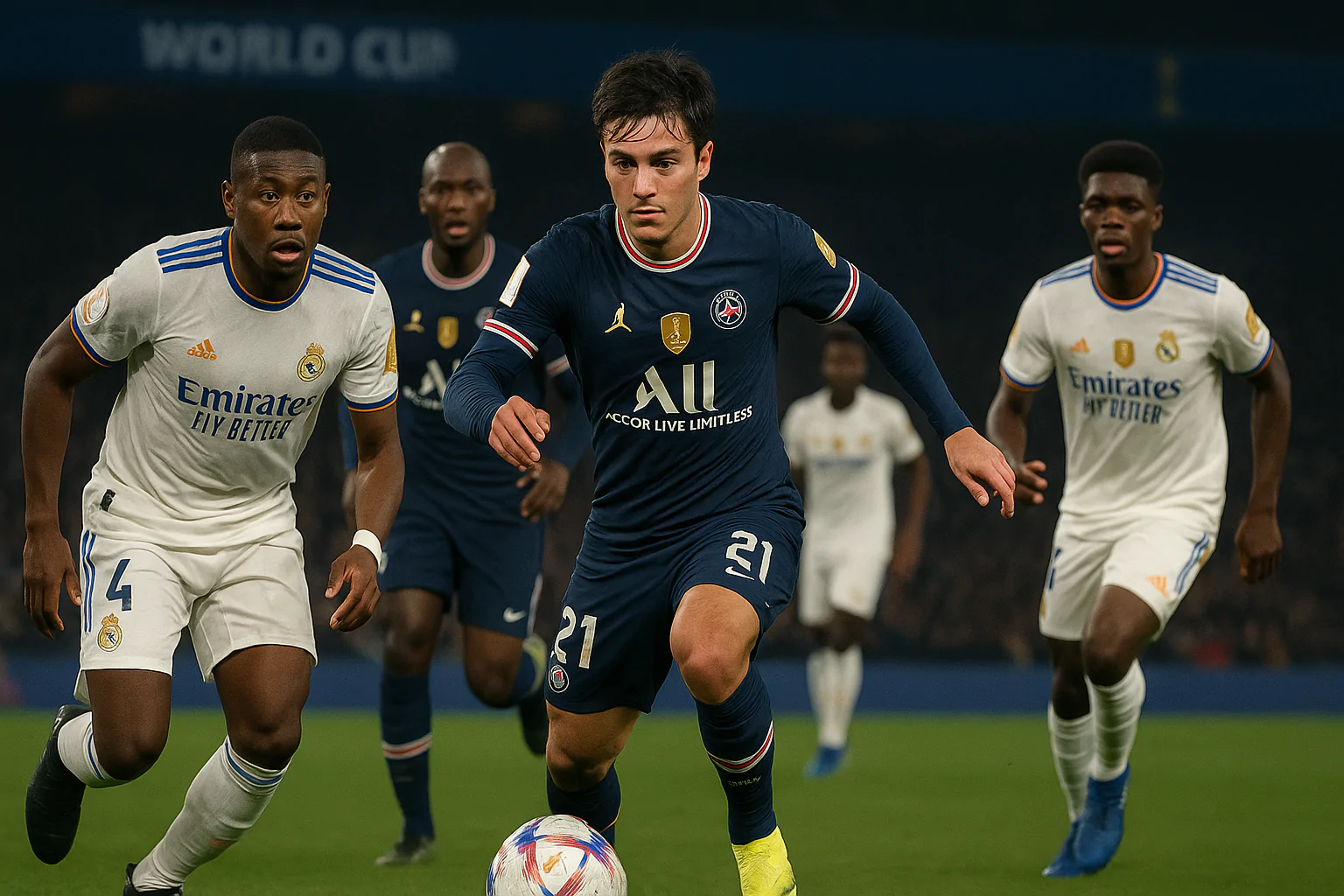Meta Description: PSG delivers stunning 4-0 victory over Real Madrid in FIFA Club World Cup semifinal. Luis Enrique’s tactical masterpiece secures final spot against former star Mbappé.
Paris Saint-Germain produced one of the most dominant performances in FIFA Club World Cup history, dismantling Real Madrid 4-0 in their semifinal clash at MetLife Stadium, New Jersey. The French champions showcased tactical brilliance under Luis Enrique, booking their place in the final while delivering a statement victory against European giants.
Match Overview and Significance
The highly anticipated semifinal carried significant narratives beyond the scoreline. Former PSG superstar Kylian Mbappé faced his previous club for the first time since joining Real Madrid, adding emotional weight to an already crucial fixture. The match represented a clash between two distinct footballing philosophies and institutional approaches.
According to multiple sports outlets, this encounter symbolized more than sporting competition—it reflected broader power dynamics within European football governance and club management strategies.
First Half Dominance
PSG’s early aggression set the tone for their comprehensive victory. The opening goal arrived in the 6th minute when Fabián Ruiz capitalized on a defensive miscommunication, converting from close range after excellent pressing forced an error.
The Spanish midfielder’s intelligent movement and clinical finishing exemplified PSG’s improved squad depth and tactical cohesion under Enrique’s guidance. His positioning and awareness throughout the match demonstrated the evolution of PSG’s midfield structure.
Ousmane Dembélé extended the lead just three minutes later, exploiting space behind Real Madrid’s defensive line with characteristic pace and precision. The French winger’s contribution highlighted PSG’s ability to create opportunities through multiple attacking channels.
Ruiz completed his brace in the 24th minute, finishing a flowing team move that originated from Achraf Hakimi’s dynamic wing play. The goal showcased PSG’s improved passing combinations and movement off the ball—hallmarks of Enrique’s tactical implementation.
Tactical Analysis
Luis Enrique deployed a flexible 4-3-3 formation that seamlessly transitioned between attacking and defensive phases. The system emphasized high pressing, quick transitions, and wing-back involvement in both defensive and offensive situations.
PSG’s midfield trio of Ruiz, Vitinha, and their supporting cast controlled tempo and space effectively, limiting Real Madrid’s creative players and maintaining possession in crucial areas. Their pressing triggers and coordinated movement disrupted Madrid’s build-up play consistently.
Real Madrid, under Xabi Alonso’s guidance, struggled to adapt to PSG’s intensity and tactical adjustments. The Spanish coach’s defensive modifications couldn’t counter PSG’s multi-dimensional attacking approach and superior execution.
Second Half Control
The second period demonstrated PSG’s tactical maturity and game management capabilities. Rather than pursuing additional goals recklessly, they maintained control while conserving energy for future fixtures.
Gonçalo Ramos sealed the victory in the 87th minute, capitalizing on his substitute appearance with a composed finish. The Portuguese striker’s contribution validated PSG’s squad rotation policy and depth across all positions.
Individual Performances
Fabián Ruiz – Man of the Match
The Spanish midfielder’s two-goal performance exemplified PSG’s improved recruitment and tactical integration. His movement, passing accuracy, and finishing ability provided the foundation for PSG’s dominance.
Ousmane Dembélé – Game Changer
Fresh from injury recovery, Dembélé’s pace, creativity, and goal threat offered constant problems for Real Madrid’s defense. His early goal established momentum that PSG maintained throughout.
Achraf Hakimi – Tactical Catalyst
The Moroccan full-back’s attacking contributions and defensive discipline highlighted PSG’s improved balance under Enrique’s system. His crossing ability and pace created numerous opportunities.
Real Madrid’s Challenges
Despite reaching this semifinal stage, Real Madrid’s performance revealed areas requiring development under Alonso’s management. The team’s defensive organization and midfield control couldn’t match PSG’s intensity and tactical precision.
Mbappé’s return to face his former club produced mixed emotions but limited impact. The French forward struggled to influence proceedings significantly, constrained by PSG’s defensive planning and his teammates’ inability to provide consistent service.
Broader Implications
This victory represents PSG’s continued evolution as a global football power. Their domestic success, combined with Champions League triumph and now Club World Cup final qualification, demonstrates sustained excellence across multiple competitions.
The performance validates Luis Enrique’s tactical approach and squad management philosophy. PSG’s ability to deliver under pressure while maintaining their playing identity suggests long-term stability and ambition.
Looking Forward
PSG will face Chelsea in the Club World Cup final on July 13, 2025, at MetLife Stadium. The English champions present different tactical challenges, but PSG’s current form and confidence suggest they enter as favorites.
Real Madrid must regroup and analyze their tactical approach under Alonso’s guidance. Despite this setback, their squad quality and institutional experience provide foundation for future success.
Conclusion
PSG’s 4-0 victory over Real Madrid delivered everything the headline promised—a genuine spectacle showcasing tactical superiority, individual brilliance, and collective determination. Luis Enrique’s team demonstrated that their recent successes represent sustainable progress rather than temporary achievement.
The match confirmed PSG’s status among world football’s elite while highlighting the competitive nature of contemporary club football. For Real Madrid, this experience provides valuable lessons as they continue adapting to new leadership and tactical systems.
With the Club World Cup final approaching, PSG has positioned themselves as serious contenders for global supremacy, backed by tactical maturity and individual quality that promises excitement for neutral observers and supporters alike.

